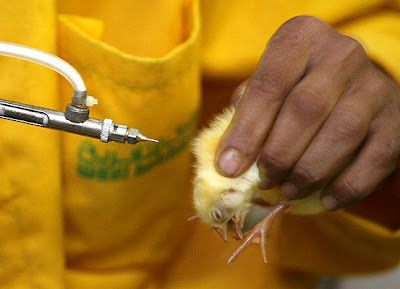Marek's disease is
one of the most ubiquitous avian infections; it is identified in chicken flocks worldwide. Every flock, except for those maintained under strict pathogen-free conditions, is presumed to be infected.
Marek disease is a highly contagious viral disease of poultry characterized by T-cell lymphomas and peripheral nerve enlargement. Standard criteria used for diagnosis include history, clinical signs, gross necropsy, and histopathology. Although no treatment is available, current vaccines are highly protective.
Chickens are the most important natural host for Marek's disease virus (MDV), a highly cell-associated but readily transmitted alphaherpesvirus with lymphotropic properties of gammaherpesviruses. Quail can be naturally infected, and turkeys can be infected experimentally. However, severe clinical outbreaks of Marek's disease in commercial turkey flocks, with mortality from tumors reaching 40%–80% between 8 and 17 weeks of age, were reported in France, Israel, and Germany. In some of these cases, the affected turkey flocks were raised in proximity to broilers. Turkeys are also commonly infected with turkey herpesvirus (HVT), an avirulent strain related to Marek's disease virus that is commonly used as a Marek's disease vaccine in chickens. Other birds and mammals appear to be refractory to the disease or infection.
Marek's disease is
one of the most ubiquitous avian infections; it is identified in chicken flocks worldwide. Every flock, except for those maintained under strict pathogen-free conditions, is presumed to be infected. Although clinical disease is not always apparent in infected flocks, a subclinical decrease in growth rate and egg production may be economically important.
Etiology of Marek Disease in Poultry
Marek's disease virus is a member of the genus
Mardivirus within the subfamily Alphaherpesvirinae. Within the genus
Mardivirus are three closely related species previously designated as three serotypes of Marek's disease virus.
Gallid alphaherpesvirus 2 (MDV serotype 1) represents all virulent Marek disease virus strains and is further divided into pathotypes, designated as mild (m), virulent (v), very virulent (vv), and very virulent plus (vv+).
Gallid alphaherpesvirus 3 (MDV serotype 2) and
Meleagrid alphaherpesvirus 1 (turkey herpesvirus, MDV serotype 3) represent avirulent virus strains isolated from chickens and turkeys, respectively, and are commonly used as vaccines against Marek's disease.
Transmission and Etiology of Marek Disease in Poultry
Marek's disease is
highly contagious and readily transmitted among chickens. The virus matures into a fully infective, enveloped form in the epithelium of the feather follicle, from which it is released into the environment. It may survive for months in poultry house litter or dust. Dust or dander from infected chickens is particularly effective in transmission. Once the virus is introduced into a chicken flock, regardless of vaccination status, infection spreads quickly from bird to bird. Infected chickens continue to be carriers for long periods and act as sources of infectious virus. Shedding of infectious virus can be reduced, but not prevented, by prior vaccination. Unlike virulent strains of Marek's disease virus, which are highly contagious, turkey herpesvirus is not readily transmissible among chickens (although it is easily transmitted among turkeys, its natural host). Attenuated Marek's disease virus strains vary greatly in their transmissibility among chickens; the most highly attenuated are not transmitted. Marek's disease virus is not vertically transmitted.
- There is no effective treatment for Marek's disease
- Prevention methods include vaccination, biosecurity, and genetic resistance
Vaccination is the central strategy for the prevention and control of Marek's disease, along with strict sanitation to reduce or delay exposure and by breeding for genetic resistance.
https://www.merckvetmanual.com/poultry/neoplasms/marek-s-disease-in-poultry
This article basically says everyone could have it...another article said 30-50% of chicken owners have it.



